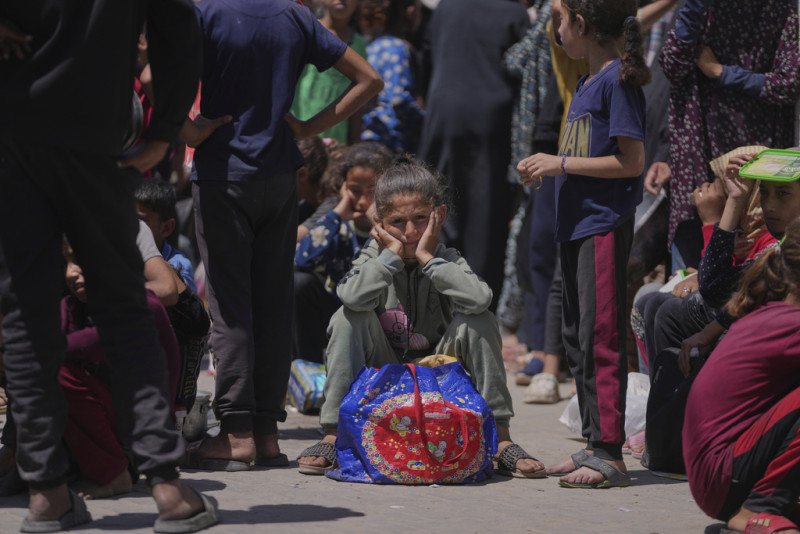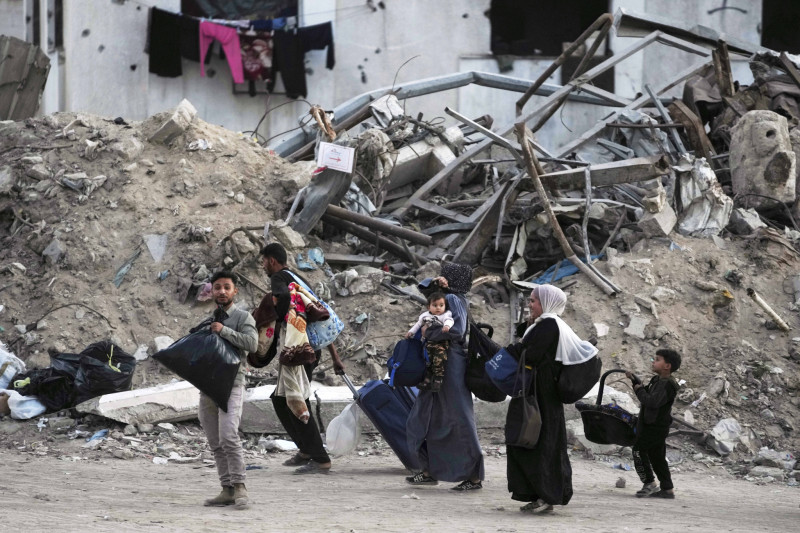Nearly two years after the Hamas attack that triggered the war, Gaza is confronted with humanitarian destruction with international pressure on Israel intensifying. But as diplomats and former officials admit, the outcome of the war ultimately depends on a single man: Donald Trump.
Almost all houses have been damaged or destroyed with the UN warning that half a million Palestinian are facing the risk of starvation due to the restriction set by Israel this month to provide humanitarian aid.
Conditions have sparked diplomatic reactions as Britain has frozen talks on a new trade agreement with Israel, the European Union is reviewing existing trade arrangements, and even close allies condemn escalation. German Chancellor Friedrich Mertz said that “he honestly no longer understands what is the goal of the Israeli army” in Gaza.
However, diplomats point out that without the pressure from Israel’s most important ally, the United States, which this week presented a new proposal for a ceasefire, the Netanyahu government is unlikely to change course, the Financial Times explains in their analysis.
In recent weeks, the Israeli prime minister and allies have appeared more unmoved than ever, committing to continuing the war until the complete destruction of Hamas and speaking openly about displacement of the Gaza population. These statements reinforce suspicions between the Palestinians and international public opinion that they do not intend to finally end the war, but seek to make Gaza not habitable.
“The real question is when Netanyahu’s behavior will begin to clash with Donald Trump’s priorities,” said Aaron David Miller, a senior researcher at Carnegie Endowment for International Peace and a former US Foreign Ministry official for over two decades.
“The Trump government has put under pressure the principle of the” absolute convergence “between the US and Israel … Whether they all constitute substantial influence, with costs and consequences in the real world, remains to be proven,” he added.
At the same time, UN officials and humanitarian organizations have been warning for weeks that the new Israeli attack, which began in March and is constantly escalating, has devastating consequences for civilians in Gaza. According to the UN, over 630,000 people have been displaced once again due to the re -launch of new hostilities. Overall, Israel’s attack has claimed the lives of more than 54,000 Palestinians, many of whom were women and children, and tens of thousands have been injured, according to local sources.
At the same time, serious concerns are also expressed by Israel’s restrictions on providing humanitarian aid that have launched the rates of Palestinians experiencing hunger conditions and forced the population to survive with absolutely basic supplies.
Following a complete ban on humanitarian aid to Gaza for more than two months, Israel has allowed this week to start operating a new, controversial system, under which an unknown until recently private company called the Gaza Humanitarian Foundation (GHF) has taken over its distribution.
Israel claims that this system was designed to prevent Hamas from withholding humanitarian aid.
However, its implementation was chaotic: chaos scenes unfolded when a huge crowd of desperate Palestinians flooded one of the GHF centers shortly after its opening.
This approach has sparked a wide condemnation by UN officials, who believe that it does not aim at the real relief of Gaza residents, but rather serves Israeli strategic objectives to displace the population.
“This is not just controlling help. It is a construction of deprivation, “said Jonathan Weattal, head of the UN Humanitarian Coordination Office (OCHA) on Wednesday in the occupied Palestinian territories.
“This system can in no way meet the needs of Gaza,” he said.
International pressures and internal outcry against Israel
Beyond Britain and the European Union, other European countries are now openly threatening with action against Israel over the humanitarian crisis in Gaza. French President Emmanuel Macron said on Friday that France is considering recognizing the Palestinian state at a conference next month, and may impose additional penalties on Israeli settlers on the West Bank. Ireland, for its part, is considering a ban on trade with Israeli businesses operating in occupied Palestinian territories.
Diplomats report that a number of factors, from the indignation of the humanitarian disaster to the contempt of Israel to the international community, led to this change of attitude. However, as they point out, the turning point was the new Israeli operation “Talks of Gideon” and the large number of civilians killed, as well as statements about the possible expulsion of the Palestinians.
“The tanks of Gideon and the level of losses on civilians are the turning point,” commented one diplomat. “As the war continues, the more extreme its goals become to justify its duration.”
At the same time, internal criticism in Israel is increasing. Yair Golan, head of the left -wing party Democrats, warned that Israel is in danger of turning into a “parliament state” unless politics change. Former Prime Minister Ehud Olmert wrote in the Haaretz newspaper that Israel is now conducting a “disaster war: indiscriminate, unlimited, cruel and criminal slaughter of civilians”.
“This is not a loss of control in an area, nor a disproportionate reaction of individual soldiers,” he wrote. “It is a government policy conscious, malicious, fraudulent, irresponsible. Yes, Israel commits war crimes. “
However, despite the growing outcry, the Netanyahu government, who insists that it acts under international law and that military pressure is the only way to release the 58 hostages that remain in Hamas’ hands, shows no intention of changing course.
On Thursday, Israel announced its intention to establish 22 new settlements on the West Bank, an action that is considered illegal under international law, in an effort to strengthen its control over the Palestinian territories. Diplomats say Israeli officials have threatened with retaliation and further punitive measures against the Palestinians, including the possible attachment of the West Bank, if more states are recognized by Palestine.
“The EU is a huge commercial partner. Many Israelis see themselves as part of the European Community and European values … So the change of attitude of some EU countries certainly hurts, “said a coalition member. “But, what happens in Washington is more important on a practical level.”
Signs of removal between Donald Trump and Benjamin Netanyahu have begun to appear in recent weeks. Trump launched talks on a new nuclear deal with Iran, despite strong Israeli reactions, finished US air strikes against Houthi rebels in Yemen without stopping to launch a rocket to Israel without a tour of Israel.
Despite the disagreements that exist, the US president – though he was elected with the promise of ending the war – then proposed the massive removal of Gaza residents, an idea embraced by the far -right allies of Netanyahu. However, so far it avoids exerting real pressure on Israel on the situation in Gaza.
When asked on Wednesday if he was “frustrated” by the way Netanyahu manages the situation in Gaza, Trump replied: “No”.
“We face the whole situation in Gaza, we carry food to the people of Gaza,” he said, before turning the conversation to Hamas’ attack on October 7, during which, according to Israeli sources, 1,200 people were killed and 250 were abandoned.
“It was a horrible day and no one is going to forget that,” he said.
Peaceful negotiations in a dead end
The US -based ceasefire proposal, which Hamas may reject, as it does not guarantee the end of war, is considered by diplomats much more favorable to Israel than for Hamas.
“The problem now is that Hamas wants the war to end and Israel not. This is not an exchange of hostages or humanitarian aid in the gauze, issues that could be compromises, ”says a person with knowledge of the negotiations.
“One side requires the end of the war and the other refuses to end it. There is no intermediate or space for compromise. “
The same source adds that “even if Hamas released all hostages, Israel would not stop. I’m not saying that one side is right or unfair, we are just there now. And as the previous agreement collapsed, it is difficult to imagine that Hamas will accept something that does not guarantee a permanent truce. “
However, without a radical change in Israeli public opinion or the collapse of the Netanyahu coalition, diplomats and former officials do not see hope to end conflict unless there is substantial pressure from the US.
“The bottom line is that it all depends on one person: Donald Trump,” former Israeli prime minister Ehud Olmert told the Financial Times. He adds that even if a fragile deal for temporary truce and hostage exchange is reached, it can create a dynamic to end the war. “But if there is no exchange, we will lead to even worse situation,” he concludes.
Source :Skai
With a wealth of experience honed over 4+ years in journalism, I bring a seasoned voice to the world of news. Currently, I work as a freelance writer and editor, always seeking new opportunities to tell compelling stories in the field of world news.












